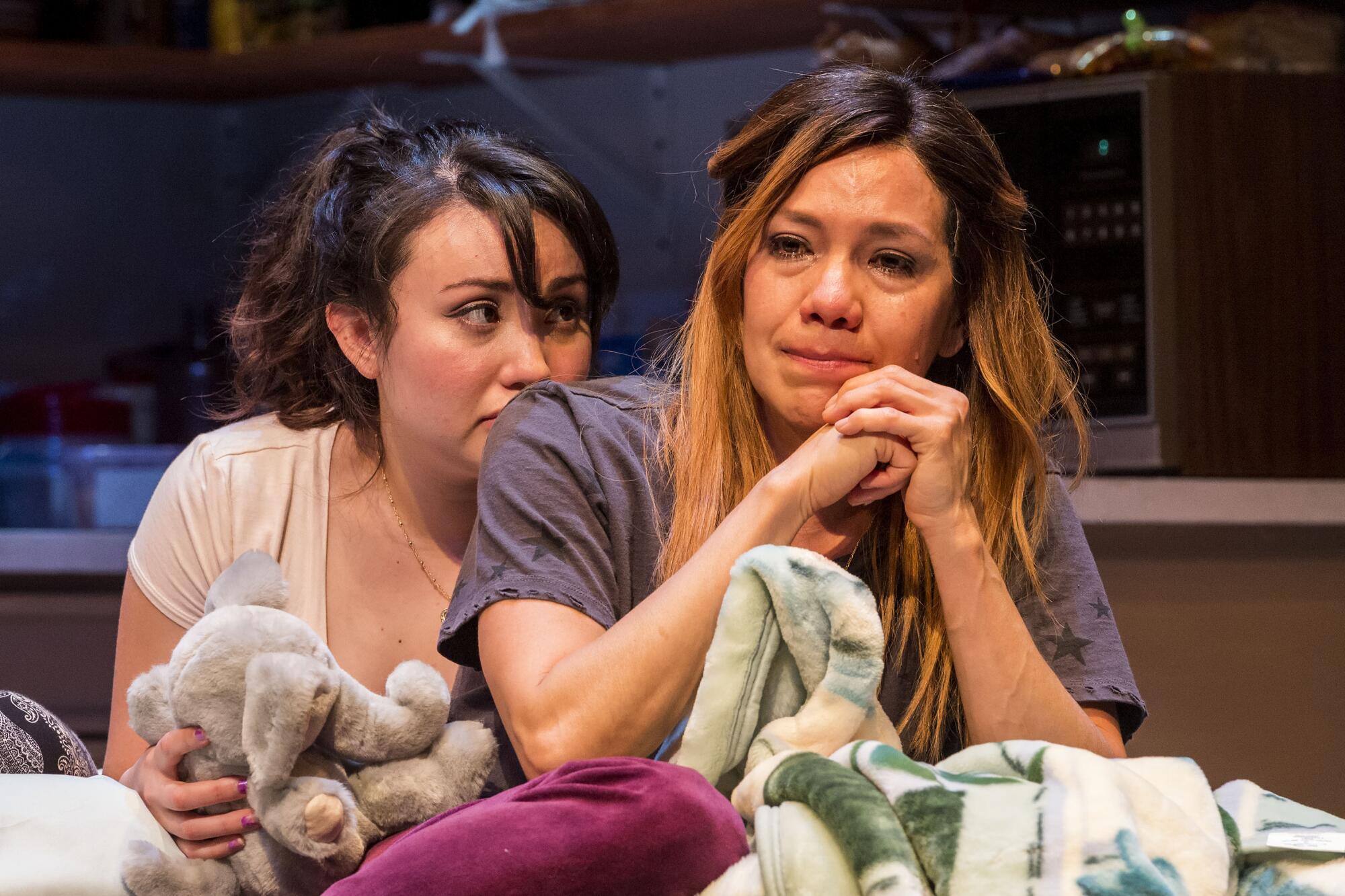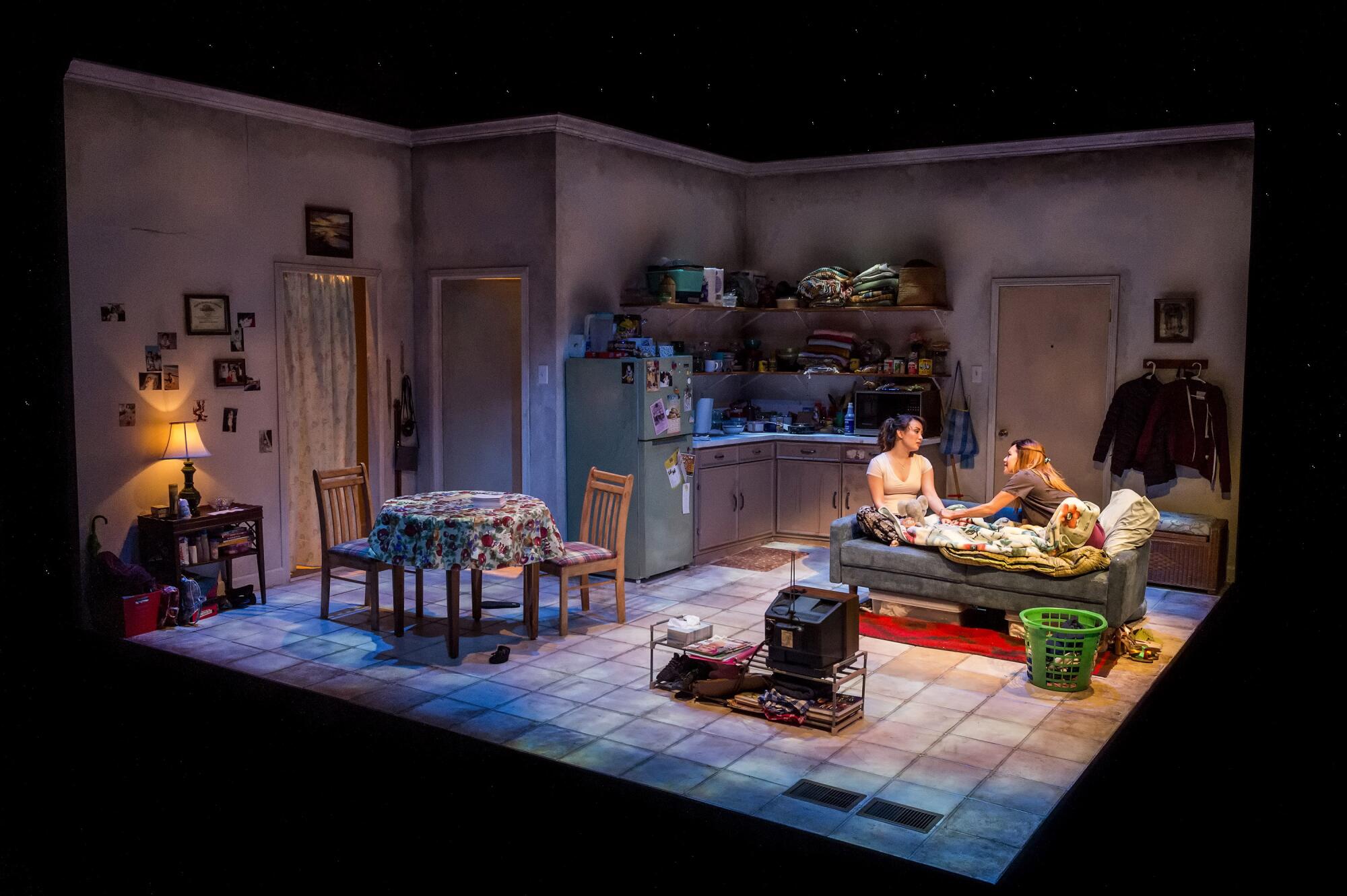- Share via

There’s a pivotal moment in “Alma” when the loudest voice in the Kirk Douglas Theatre is that of Donald Trump. Though the former president is not a portrayed character, nor is his name ever said by either of the play’s characters, the volume of his anti-Mexican rhetoric, emanating from a small yet clunky TV set just inches off the floor, grows louder and louder until his diatribe almost feels omnipresent, drowning out everything else onstage.
Playwright Benjamin Benne felt similarly when he first heard Trump say those words during his initial candidacy announcement in 2015. “He was seemingly able to get away with spewing a lot of really horrible, hateful, dangerous things, without anybody really checking him on it,” he recalls. “It surprised and terrified me, I was just so afraid. I felt called to combat that rhetoric directly and write about the people he was demonizing and dehumanizing, and showcase the fullness of their humanity.”
That call to action comes through in Benne’s play “Alma,” now receiving its world premiere through April 3 as part of a Center Theatre Group initiative to turn its Culver City venue into a theatrical springboard for local voices.
Set days after the 2016 presidential election, the poetic yet realistic dramedy peers inside the one-bedroom La Puente apartment of Alma, an undocumented immigrant who works hourly-wage jobs, and Angel, her American-born daughter who is expected to take the SAT exam the following morning. Their bilingual arguments about the value of “the American dream,” and whether making unfathomable sacrifices and meeting impossible expectations is the best way to achieve it, are all the more amplified in California — colonized land that used to be part of Mexico.

“The fear of not having control over one’s life, not having the option to declare what home is for you, standing on ground that you’ve been told is not yours — all of that has a deep, unspoken impact,” says director Juliette Castillo. “This play is built on the nuances of how this relationship navigates the circumstances of Alma being undocumented, and the emotional undercurrent of living a life with that kind of stress.”
The plot of “Alma” hits home for 34-year-old Benne, who grew up in Hacienda Heights and whose mother was previously an undocumented immigrant from Guatemala. To make it as emotionally and linguistically accurate as possible, he consulted with immigration lawyers about the arduous pathways to citizenship, read books like Gloria Anzaldúa’s “Borderlands/La Frontera” and hired translators to specify colloquialisms or slang more specific to Mexican Spanish speakers.
Benne also interviewed friends of Latinx heritage about their childhoods, and asked them to interview their immigrant mothers on his behalf. “Doing that really affirmed that there were many other people with the experiences that my mother and I had,” he recalls. “That gave me some confidence that the play could hold, people could watch it and it would resonate with them.”
At the core of “Alma” is a truthful, dimensional richness of mother-daughter dynamics, one that’s very specific when involving an immigrant parent and a first-generation American child. Take, for example, Benne’s deft use of language: As the two argue about social location and upward mobility, Alma (Cheryl Umaña) switches between Spanish and English multiple times within a single sentence, and occasionally appears frustrated by her lack of everyday English vocabulary. When heated, Angel (Sabrina Fest) corrects her mother’s grammar as a way to undercut her parental authority; when apologetic, she helps her mother with pronunciation and phrasing as expressions of care.

“We just want to tell the truth with this play because it’s so many people’s stories, especially here in Los Angeles,” says Umaña. “Angel doesn’t know that the pain Alma suffers — her swollen feet at the end of the night, or missing a rent payment and being on the verge of being kicked out of the apartment — is what motivates her to push her daughter toward going away to college. And Angel wants to protect her mother herself. They both have a point; they both just have the best intentions for each other.”
The 75-minute vignette unfolds in real time, in an apartment positioned in the venue like an island, floating in an abyss. Though their conversations do get heavy, they’re never melodramatic, and tense exchanges are broken up by loving punch lines and even some chancla-centric physical comedy. It’s a strategy that not only provides relief for the audience but also genuinely reflects who these characters are to each other.
“A lot of pieces for the white gaze tend to focus more on people’s pain and suffering,” says Benne. “While I want to be true to the struggles people have, especially in situations like Alma and Angel’s, I hope that we also get to see the multiplicity of the love and care they have for each other: their sense of humor with one another, their softness and intimacy with each other, built over their many years together.

“Love stories are so important to me,” he continues. “I see so many plays where the crux of the drama is all about power dynamics, dominance and subjugation, people trying to destroy each other and meaning to harm or commit acts of violence against each other, whether emotional or physical. But I’m interested in telling stories where people care deeply about each other and are trying to navigate those relationships as best they can, even if they mess up a bit in doing so.”
Benne, who graduates from the Yale School of Drama MFA playwriting program in May, is currently writing a piece commissioned by South Coast Repertory, “Fantasma,” about “how families pass down cultural customs and heritage as heirlooms between generations, and what gets lost or preserved in the space of assimilation in the United States.” His religious rom-com “In His Hands” will have its world premiere this summer in Washington, D.C.; productions of “Alma” will play in Seattle and Chicago later this year.
Though Trump’s speech may have been the impetus for “Alma” seven years ago, Benne hopes his written words resonate beyond any particular administration.
“Whether seeking a better life or asylum, there has never been a good time to be an immigrant coming from south of the border to the United States,” says Benne. “Looking at the long history of immigration in this country, so much of who has been discluded from citizenship and labeled as ‘threatening’ is determined by xenophobia and racism, even though these members of our communities are vital and important. It certainly felt like an amplified moment with Trump in office, but the fact is, it wasn’t good before and it certainly hasn’t been good after either, even now.”

'Alma'
Where: Kirk Douglas Theatre, 9820 Washington Blvd, Culver City, CA 90232
When: 8 p.m. Tuesdays-Fridays, 2 and 8 p.m. Saturday and 1 and 6:30 p.m. Sundays. Ends April 3
Tickets: $30-75 (subject to change)
Contact: (213) 628-2772 or centertheatregroup.org
Running time: 1 hour, 16 minutes (no intermission)
More to Read
The biggest entertainment stories
Get our big stories about Hollywood, film, television, music, arts, culture and more right in your inbox as soon as they publish.
You may occasionally receive promotional content from the Los Angeles Times.












